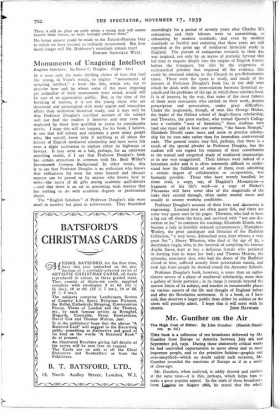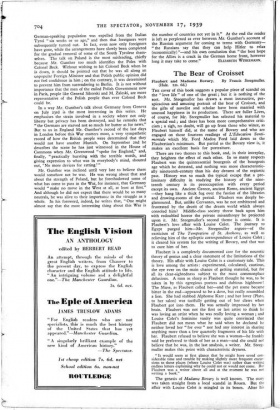Mr. Gunther on the Air
Tins book is a collection of ten broadcasts delivered by Mr. Gunther from to America between July gth and September 3rd, 1939. During those immensely critical weeks he had unrivalled opportunities to move about and to meet important people, and in the primitive fashion—graphic and over-simplified—which no doubt suited each occasion, Mr. Gunther recorded the emotions of Europe as if in a series of close-ups.
Mr. Gunther, when analysed, is oddly shrewd and careless at the same time—it is this, perhaps, which helps him to make a great popular appeal. In the sixth of these broadcasts, from Landon on August 28th, he stated that the whole German-speaking population was expelled from the Italian Tyrol " six weeks or so ago," and then that foreigners were subsequently turned out. In fact, even now only foreigners have gone, while the arrangements have slowly been completed for the gradual removal of some of the South Tyrolese them- selves. The talk on Poland is the most misleading, chiefly because Mr. Gunther too much identifies the Poles with Colonel Beck. Without wishing to hit Colonel Beck when he is down, it should be pointed out that he was all along an unpopular Foreign Minister and that Polish public opinion did not feel confidence in him ; on the contrary, it was determined to prevent him from surrendering to Berlin. It is not without importance that the men of the exiled Polish Government now in Paris, people like General Sikorski and M. Zaleski, are more representative of the Polish people than ever Colonel Beck could be.
In a way Mr. Gunther's talk about Germany from Geneva on July 23rd is the most interesting in this series. He emphasises the strain involved in a society where not only liberty but privacy has been destroyed, and he remarks that "the Germans are starved not so much for butter as for news." But to us in England Mr. Gunther's record of the last days in London before this War matters most, a very sympathetic record of how the British people were determined that they would not have another Munich. On September 2nd he describes the scene he has just witnessed in the House of Commons when Mr. Greenwood " spoke for England," and, finally, " practically bursting with the terrible words, and giving expression to what was in everybody's mind, shouted out, ' No more devices for ratting.'" Mr. Gunther was inclined until very late to believe there would somehow not be war. He was wrong about that and about the strength of Poland, but he foreshadowed some of what has come to pass in the War, for instance, that Germany would " make no move in the West at all, at least at first." And although he did not expect that there would be so many neutrals, he was alive to their importance in the struggle as a whole. In his foreword, indeed, he writes that, " One might almost say that the most interesting thing about this War is the number of countries not yet in it." At the end the reader is left as perplexed as ever between Mr. Gunther's account of the Russian argument for coming to terms with Germany- " the Russians say that they can help Hitler to relax (economically) "—and his own conclusion that " the best hope for the Allies is a crack in the German home front, however





































































 Previous page
Previous page